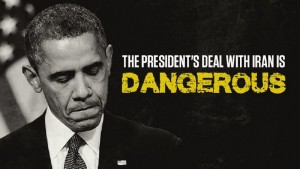Saudi-Iran Skirmish Needs US Leadership: Van Hipp
The centuries-long rift between Sunni and Shiite Muslims in the Middle East is boiling over. Following Saudi Arabia’s execution of the well-known Sheik Nimr al-Nimr, Iranian protesters stormed the Saudi embassy in Tehran and set it on fire.
The cleric was born in Saudi Arabia, but received Shiite religious education in both Iran and Syria. He was the ringleader behind the anti-Saudi government demonstrations during the Arab Spring of 2011.
When al-Nimr was sentenced in October of 2014, Iran’s military chief warned that Saudi Arabia would “pay dearly” if he were executed. Interestingly, while al-Nimr and three other Shiites were executed on terrorism charges, over 40 Sunni radical Islamists were also executed for terrorism.
As a result of the burning of its embassy, Saudi Arabia severed diplomatic ties with Iran and cut off trade and travel. Other Sunni allies followed suit. Bahrain cut diplomatic ties and stopped all flights to and from Iran. The UAE downgraded Iran’s diplomatic team. Sudan also severed diplomatic ties with Iran.
The schism between the Sunni and Shiite branches of Islam is nothing new. It goes back nearly 1,400 years ago to the death of Muhammad when a debate arose over who should be his successor. In 680 A.D., the Battle of Karbala took place, which ended with the defeat of the Shiites, led by Hussein, who was the grandson of the Prophet Muhammad. For Shiites, Hussein was viewed as a martyr, while his Sunni rival, Yazid, and the Umayyad caliphate were viewed as the personification of evil.
The rift between the Sunnis and Shiites has continued ever since. While the Shiite branch of Islam is much smaller, comprising roughly 15 percent of the world’s Muslims, both Shiite and Sunni have jihadists in their ranks.
The fact that this historic rift is now boiling over should cause us to ask how we got here. We’ve sent all the wrong messages to friend and foe alike. As a result, we’re now beginning to see the initial ramifications of a very bad nuclear deal with Iran. Iran and radical Shiite elements feel emboldened and the moderate Sunni nations no longer trust us.

Sure, Saudi Arabia has been an unreliable ally. Many of the 9/11 hijackers were from Saudi Arabia and financing for many of the madrassas in Pakistan can be traced back to Saudi Arabia. However, the Saudis are now dealing with radical Sunni elements, such as ISIS, as well as radical Shiite elements. The kingdom has come down hard recently against both Shiite and Sunni jihadists.
Other moderate Sunni Arab nations are in the same predicament and are following suit. King Abdullah of Jordan, one of our most dependable allies in the region, has referred to it as World War III and as a “War within Islam.”
King Abdullah actually came to our Congress last year, complaining of various bureaucratic roadblocks courtesy of our State Department that were hindering his efforts to fight ISIS and radical Islam.
And just last week, the U.S. State Department still repeated what we’ve all known, “We still believe Iran is a state sponsor of terrorism.”
Yet we cut a bad nuclear deal with a state sponsor of terrorism and are now beginning to see its ramifications. To further show just how emboldened Iran has become, it conducted two ballistic missile tests after the nuclear deal was announced.
The U.S. response? No real consequences — again, the wrong message to our allies and enemies. These actions encourage Iran and tell moderate Sunni Arab nations that the U.S. is weak and has no real strategy when it comes to the Middle East.
Moderate Sunni nations are feeling squeezed. Just a couple of weeks ago, Prince Muhammed, Saudi’s young minister of defense, announced the formation of a Muslim Anti-Terror Coalition. Here was a real opportunity for the U.S. to lead and encourage them. Encourage them to share intelligence, encourage them to put together a ground force (as they did against the Houthi rebels in Yemen), and encourage them to take out the 35 known ISIS media centers that are producing jihadist propaganda.
Van Hipp, former Deputy Assistant Secretary for the U.S. Army, is chairman of American Defense International, Inc. (ADI), a Washington, D.C. consulting firm. He is former chairman of the South Carolina Republican Party, and served on the Presidential Electoral College in 1988. He is the author of “The New Terrorism: How to Fight It and Defeat It.” To read more of his reports, Go Here Now.


